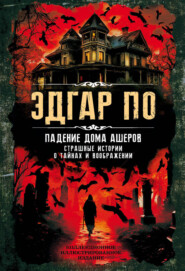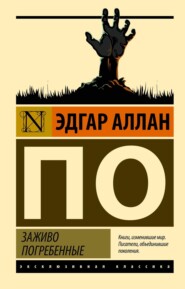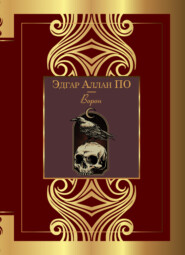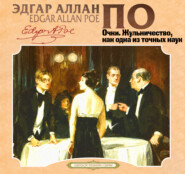По всем вопросам обращайтесь на: info@litportal.ru
(©) 2003-2024.
✖
The Complete Stories of Edgar Allan Poe
Настройки чтения
Размер шрифта
Высота строк
Поля
They had now evidently reached the strong hold of the pestilence. Their way at every step or plunge grew more noisome and more horrible – the paths more narrow and more intricate. Huge stones and beams falling momently from the decaying roofs above them, gave evidence, by their sullen and heavy descent, of the vast height of the surrounding houses; and while actual exertion became necessary to force a passage through frequent heaps of rubbish, it was by no means seldom that the hand fell upon a skeleton or rested upon a more fleshly corpse.
Suddenly, as the seamen stumbled against the entrance of a tall and ghastly-looking building, a yell more than usually shrill from the throat of the excited Legs, was replied to from within, in a rapid succession of wild, laughter-like, and fiendish shrieks. Nothing daunted at sounds which, of such a nature, at such a time, and in such a place, might have curdled the very blood in hearts less irrevocably on fire, the drunken couple rushed headlong against the door, burst it open, and staggered into the midst of things with a volley of curses.
The room within which they found themselves proved to be the shop of an undertaker; but an open trap-door, in a corner of the floor near the entrance, looked down upon a long range of wine-cellars, whose depths the occasional sound of bursting bottles proclaimed to be well stored with their appropriate contents. In the middle of the room stood a table – in the centre of which again arose a huge tub of what appeared to be punch. Bottles of various wines and cordials, together with jugs, pitchers, and flagons of every shape and quality, were scattered profusely upon the board. Around it, upon coffin-tressels, was seated a company of six. This company I will endeavor to delineate one by one.
Fronting the entrance, and elevated a little above his companions, sat a personage who appeared to be the president of the table. His stature was gaunt and tall, and Legs was confounded to behold in him a figure more emaciated than himself. His face was as yellow as saffron – but no feature excepting one alone, was sufficiently marked to merit a particular description. This one consisted in a forehead so unusually and hideously lofty, as to have the appearance of a bonnet or crown of flesh superadded upon the natural head. His mouth was puckered and dimpled into an expression of ghastly affability, and his eyes, as indeed the eyes of all at table, were glazed over with the fumes of intoxication. This gentleman was clothed from head to foot in a richly-embroidered black silk-velvet pall, wrapped negligently around his form after the fashion of a Spanish cloak. His head was stuck full of sable hearse-plumes, which he nodded to and fro with a jaunty and knowing air; and, in his right hand, he held a huge human thigh-bone, with which he appeared to have been just knocking down some member of the company for a song.
Opposite him, and with her back to the door, was a lady of no whit the less extraordinary character. Although quite as tall as the person just described, she had no right to complain of his unnatural emaciation. She was evidently in the last stage of a dropsy; and her figure resembled nearly that of the huge puncheon of October beer which stood, with the head driven in, close by her side, in a corner of the chamber. Her face was exceedingly round, red, and full; and the same peculiarity, or rather want of peculiarity, attached itself to her countenance, which I before mentioned in the case of the president – that is to say, only one feature of her face was sufficiently distinguished to need a separate characterization: indeed the acute Tarpaulin immediately observed that the same remark might have applied to each individual person of the party; every one of whom seemed to possess a monopoly of some particular portion of physiognomy. With the lady in question this portion proved to be the mouth. Commencing at the right ear, it swept with a terrific chasm to the left – the short pendants which she wore in either auricle continually bobbing into the aperture. She made, however, every exertion to keep her mouth closed and look dignified, in a dress consisting of a newly starched and ironed shroud coming up close under her chin, with a crimpled ruffle of cambric muslin.
At her right hand sat a diminutive young lady whom she appeared to patronise. This delicate little creature, in the trembling of her wasted fingers, in the livid hue of her lips, and in the slight hectic spot which tinged her otherwise leaden complexion, gave evident indications of a galloping consumption. An air of gave extreme haut ton, however, pervaded her whole appearance; she wore in a graceful and degagé manner, a large and beautiful winding-sheet of the finest India lawn; her hair hung in ringlets over her neck; a soft smile played about her mouth; but her nose, extremely long, thin, sinuous, flexible and pimpled, hung down far below her under lip, and in spite of the delicate manner in which she now and then moved it to one side or the other with her tongue, gave to her countenance a somewhat equivocal expression.
Over against her, and upon the left of the dropsical lady, was seated a little puffy, wheezing, and gouty old man, whose cheeks reposed upon the shoulders of their owner, like two huge bladders of Oporto wine. With his arms folded, and with one bandaged leg deposited upon the table, he seemed to think himself entitled to some consideration. He evidently prided himself much upon every inch of his personal appearance, but took more especial delight in calling attention to his gaudy-colored surtout. This, to say the truth, must have cost him no little money, and was made to fit him exceedingly well – being fashioned from one of the curiously embroidered silken covers appertaining to those glorious escutcheons which, in England and elsewhere, are customarily hung up, in some conspicuous place, upon the dwellings of departed aristocracy.
Next to him, and at the right hand of the president, was a gentleman in long white hose and cotton drawers. His frame shook, in a ridiculous manner, with a fit of what Tarpaulin called “the horrors.” His jaws, which had been newly shaved, were tightly tied up by a bandage of muslin; and his arms being fastened in a similar way at the wrists, prevented him from helping himself too freely to the liquors upon the table; a precaution rendered necessary, in the opinion of Legs, by the peculiarly sottish and wine-bibbing cast of his visage. A pair of prodigious ears, nevertheless, which it was no doubt found impossible to confine, towered away into the atmosphere of the apartment, and were occasionally pricked up in a spasm, at the sound of the drawing of a cork.
Fronting him, sixthly and lastly, was situated a singularly stiff-looking personage, who, being afflicted with paralysis, must, to speak seriously, have felt very ill at ease in his unaccommodating habiliments. He was habited, somewhat uniquely, in a new and handsome mahogany coffin. Its top or head-piece pressed upon the skull of the wearer, and extended over it in the fashion of a hood, giving to the entire face an air of indescribable interest. Arm-holes had been cut in the sides, for the sake not more of elegance than of convenience; but the dress, nevertheless, prevented its proprietor from sitting as erect as his associates; and as he lay reclining against his tressel, at an angle of forty-five degrees, a pair of huge goggle eyes rolled up their awful whites towards the celling in absolute amazement at their own enormity.
Before each of the party lay a portion of a skull, which was used as a drinking cup. Overhead was suspended a human skeleton, by means of a rope tied round one of the legs and fastened to a ring in the ceiling. The other limb, confined by no such fetter, stuck off from the body at right angles, causing the whole loose and rattling frame to dangle and twirl about at the caprice of every occasional puff of wind which found its way into the apartment. In the cranium of this hideous thing lay quantity of ignited charcoal, which threw a fitful but vivid light over the entire scene; while coffins, and other wares appertaining to the shop of an undertaker, were piled high up around the room, and against the windows, preventing any ray from escaping into the street.
At sight of this extraordinary assembly, and of their still more extraordinary paraphernalia, our two seamen did not conduct themselves with that degree of decorum which might have been expected. Legs, leaning against the wall near which he happened to be standing, dropped his lower jaw still lower than usual, and spread open his eyes to their fullest extent: while Hugh Tarpaulin, stooping down so as to bring his nose upon a level with the table, and spreading out a palm upon either knee, burst into a long, loud, and obstreperous roar of very ill-timed and immoderate laughter.
Without, however, taking offence at behavior so excessively rude, the tall president smiled very graciously upon the intruders – nodded to them in a dignified manner with his head of sable plumes – and, arising, took each by an arm, and led him to a seat which some others of the company had placed in the meantime for his accommodation. Legs to all this offered not the slightest resistance, but sat down as he was directed; while the gallant Hugh, removing his coffin tressel from its station near the head of the table, to the vicinity of the little consumptive lady in the winding sheet, plumped down by her side in high glee, and pouring out a skull of red wine, quaffed it to their better acquaintance. But at this presumption the stiff gentleman in the coffin seemed exceedingly nettled; and serious consequences might have ensued, had not the president, rapping upon the table with his truncheon, diverted the attention of all present to the following speech:
“It becomes our duty upon the present happy occasion” —
“Avast there!” interrupted Legs, looking very serious, “avast there a bit, I say, and tell us who the devil ye all are, and what business ye have here, rigged off like the foul fiends, and swilling the snug blue ruin stowed away for the winter by my honest shipmate, Will Wimble the undertaker!”
At this unpardonable piece of ill-breeding, all the original company half started to their feet, and uttered the same rapid succession of wild fiendish shrieks which had before caught the attention of the seamen. The president, however, was the first to recover his composure, and at length, turning to Legs with great dignity, recommenced:
“Most willingly will we gratify any reasonable curiosity on the part of guests so illustrious, unbidden though they be. Know then that in these dominions I am monarch, and here rule with undivided empire under the title of ‘King Pest the First.’
“This apartment, which you no doubt profanely suppose to be the shop of Will Wimble the undertaker – a man whom we know not, and whose plebeian appellation has never before this night thwarted our royal ears – this apartment, I say, is the Dais-Chamber of our Palace, devoted to the councils of our kingdom, and to other sacred and lofty purposes.
“The noble lady who sits opposite is Queen Pest, our Serene Consort. The other exalted personages whom you behold are all of our family, and wear the insignia of the blood royal under the respective titles of ‘His Grace the Arch Duke Pest-Iferous’ – ‘His Grace the Duke PestIlential’ – ‘His Grace the Duke TemPest’ – and ‘Her Serene Highness the Arch Duchess Ana-Pest.’
“As regards,” continued he, “your demand of the business upon which we sit here in council, we might be pardoned for replying that it concerns, and concerns alone, our own private and regal interest, and is in no manner important to any other than ourself. But in consideration of those rights to which as guests and strangers you may feel yourselves entitled, we will furthermore explain that we are here this night, prepared by deep research and accurate investigation, to examine, analyze, and thoroughly determine the indefinable spirit – the incomprehensible qualities and nature – of those inestimable treasures of the palate, the wines, ales, and liqueurs of this goodly metropolis: by so doing to advance not more our own designs than the true welfare of that unearthly sovereign whose reign is over us all, whose dominions are unlimited, and whose name is ‘Death.’ “
“Whose name is Davy Jones!” ejaculated Tarpaulin, helping the lady by his side to a skull of liqueur, and pouring out a second for himself.
“Profane varlet!” said the president, now turning his attention to the worthy Hugh, “profane and execrable wretch! – we have said, that in consideration of those rights which, even in thy filthy person, we feel no inclination to violate, we have condescended to make reply to thy rude and unseasonable inquiries. We nevertheless, for your unhallowed intrusion upon our councils, believe it our duty to mulct thee and thy companion in each a gallon of Black Strap – having imbibed which to the prosperity of our kingdom – at a single draught – and upon your bended knees – ye shall be forthwith free either to proceed upon your way, or remain and be admitted to the privileges of our table, according to your respective and individual pleasures.”
“It would be a matter of utter impossibility,” replied Legs, whom the assumptions and dignity of King Pest the First had evidently inspired some feelings of respect, and who arose and steadied himself by the table as he spoke – “It would, please your majesty, be a matter of utter impossibility to stow away in my hold even one-fourth part of that same liquor which your majesty has just mentioned. To say nothing of the stuffs placed on board in the forenoon by way of ballast, and not to mention the various ales and liqueurs shipped this evening at different sea-ports, I have, at present, a full cargo of ‘humming stuff’ taken in and duly paid for at the sign of the ‘Jolly Tar.’ You will, therefore, please your majesty, be so good as to take the will for the deed – for by no manner of means either can I or will I swallow another drop – least of all a drop of that villanous bilge-water that answers to the hail of ‘Black Strap.’ “
“Belay that!” interrupted Tarpaulin, astonished not more at the length of his companion’s speech than at the nature of his refusal – “Belay that, you lubber! – and I say, Legs, none of your palaver! My hull is still light, although I confess you yourself seem to be a little top-heavy; and as for the matter of your share of the cargo, why rather than raise a squall I would find stowage-room for it myself, but” —
“This proceeding,” interposed the president, “is by no means in accordance with the terms of the mulct or sentence, which is in its nature Median, and not to be altered or recalled. The conditions we have imposed must be fulfilled to the letter, and that without a moment’s hesitation – in failure of which fulfilment we decree that you do here be tied neck and heels together, and duly drowned as rebels in yon hogshead of October beer!”
“A sentence! – a sentence! – a righteous and just sentence! – a glorious decree! – a most worthy and upright, and holy condemnation!” shouted the Pest family altogether. The king elevated his forehead into innumerable wrinkles; the gouty little old man puffed like a pair of bellows; the lady of the winding sheet waved her nose to and fro; the gentleman in the cotton drawers pricked up his ears; she of the shroud gasped like a dying fish; and he of the coffin looked stiff and rolled up his eyes.
“Ugh! ugh! ugh!” chuckled Tarpaulin, without heeding the general excitation, “ugh! ugh! ugh! – ugh! ugh! ugh! – ugh! ugh! ugh! – I was saying,” said he, “I was saying when Mr. King Pest poked in his marlin-spike, that as for the matter of two or three gallons more or less of Black Strap, it was a trifle to a tight sea-boat like myself not overstowed – but when it comes to drinking the health of the Devil (whom God assoilzie) and going down upon my marrow bones to his ill-favored majesty there, whom I know, as well as I know myself to be a sinner, to be nobody in the whole world, but Tim Hurlygurly the stage-player! – why! it’s quite another guess sort of a thing, and utterly and altogether past my comprehension.”
He was not allowed to finish this speech in tranquillity. At the name Tim Hurlygurly the whole assembly leaped from their name seats.
“Treason!” shouted his Majesty King Pest the First.
“Treason!” said the little man with the gout.
“Treason!” screamed the Arch Duchess Ana-Pest.
“Treason!” muttered the gentleman with his jaws tied up.
“Treason!” growled he of the coffin.
“Treason! treason!” shrieked her majesty of the mouth; and, seizing by the hinder part of his breeches the unfortunate Tarpaulin, who had just commenced pouring out for himself a skull of liqueur, she lifted him high into the air, and let him fall without ceremony into the huge open puncheon of his beloved ale. Bobbing up and down, for a few seconds, like an apple in a bowl of toddy, he, at length, finally disappeared amid the whirlpool of foam which, in the already effervescent liquor, his struggles easily succeeded in creating.
Not tamely, however, did the tall seaman behold the discomfiture of his companion. Jostling King Pest through the open trap, the valiant Legs slammed the door down upon him with an oath, and strode towards the centre of the room. Here tearing down the skeleton which swung over the table, he laid it about him with so much energy and good will, that, as the last glimpses of light died away within the apartment, he succeeded in knocking out the brains of the little gentleman with the gout. Rushing then with all his force against the fatal hogshead full of October ale and Hugh Tarpaulin, he rolled it over and over in an instant. Out burst a deluge of liquor so fierce – so impetuous – so overwhelming – that the room was flooded from wall to wall – the loaded table was overturned – the tressels were thrown upon their backs – the tub of punch into the fireplace – and the ladies into hysterics. Piles of death-furniture floundered about. Jugs, pitchers, and carboys mingled promiscuously in the melée, and wicker flagons encountered desperately with bottles of junk. The man with the horrors was drowned upon the spot – the little stiff gentleman floated off in his coffin – and the victorious Legs, seizing by the waist the fat lady in the shroud, rushed out with her into the street, and made a bee-line for the “Free and Easy,” followed under easy sail by the redoubtable Hugh Tarpaulin, who, having sneezed three or four times, panted and puffed after him with the Arch Duchess Ana-Pest.
THE END
Morella (1835)
Αυτο χαθ’ αυτο μεθ’ αυτου, μονο ειδες αιει ον.
Itself – alone by itself – eternally one and single.
Plato, Sympos.
With a feeling of deep yet most singular affection I regarded my friend Morella. Thrown by accident into her society many years ago, my soul, from our first meeting, burned with fires it had never before known; but the fires were not of Eros, and bitter and tormenting to my spirit was the gradual conviction that I could in no manner define their unusual meaning, or regulate their vague intensity. Yet we met; and fate bound us together at the altar; and I never spoke of passion, nor thought of love. She, however, shunned society, and, attaching herself to me alone, rendered me happy. It is a happiness to wonder; – it is a happiness to dream.
Morella’s erudition was profound. As I hope to live, her talents were of no common order – her powers of mind were gigantic. I felt this, and, in many matters, became her pupil. I soon, however, found that, perhaps on account of her Presburg education, she placed before me a number of those mystical writings which are usually considered the mere dross of the early German literature. These, for what reason I could not imagine, were her favorite and constant study – and that, in process of time they became my own, should be attributed to the simple but effectual influence of habit and example.
In all this, if I err not, my reason had little to do. My convictions, or I forget myself, were in no manner acted upon by the ideal, nor was any tincture of the mysticism which I read, to be discovered, unless I am greatly mistaken, either in my deeds or in my thoughts. Persuaded of this, I abandoned myself implicitly to the guidance of my wife, and entered with an unflinching heart into the intricacies of her studies. And then – then, when, pouring over forbidden pages, I felt a forbidden spirit enkindling within me – would Morella place her cold hand upon my own, and rake up from the ashes of a dead philosophy some low, singular words, whose strange meaning burned themselves in upon my memory. And then, hour after hour, would I linger by her side, and dwell upon the music of her voice – until, at length, its melody was tainted with terror, – and there fell a shadow upon my soul – and I grew pale, and shuddered inwardly at those too unearthly tones. And thus, joy suddenly faded into horror, and the most beautiful became the most hideous, as Hinnon became Ge-Henna.
It is unnecessary to state the exact character of those disquisitions which, growing out of the volumes I have mentioned, formed, for so long a time, almost the sole conversation of Morella and myself. By the learned in what might be termed theological morality they will be readily conceived, and by the unlearned they would, at all events, be little understood. The wild Pantheism of Fichte; the modified Παλιγγενεσια of the Pythagoreans; and, above all, the doctrines of Identity as urged by Schelling, were generally the points of discussion presenting the most of beauty to the imaginative Morella. That identity which is termed personal, Mr. Locke, I think, truly defines to consist in the saneness of rational being. And since by person we understand an intelligent essence having reason, and since there is a consciousness which always accompanies thinking, it is this which makes us all to be that which we call ourselves – thereby distinguishing us from other beings that think, and giving us our personal identity. But the principium individuationis – the notion of that identity which at death is or is not lost for ever, was to me – at all times, a consideration of intense interest; not more from the perplexing and exciting nature of its consequences, than from the marked and agitated manner in which Morella mentioned them.
But, indeed, the time had now arrived when the mystery of my wife’s manner oppressed me as a spell. I could no longer bear the touch of her wan fingers, nor the low tone of her musical language, nor the lustre of her melancholy eyes. And she knew all this, but did not upbraid; she seemed conscious of my weakness or my folly, and, smiling, called it Fate. She seemed,also, conscious of a cause, to me unknown, for the gradual alienation of my regard; but she gave me no hint or token of its nature. Yet was she woman, and pined away daily. In time, the crimson spot settled steadily upon the cheek, and the blue veins upon the pale forehead became prominent; and one instant, my nature melted into pity, but, in the next, I met the glance of her meaning eyes, and then my soul sickened and became giddy with the giddiness of one who gazes downward into some dreary and unfathomable abyss.
Shall I then say that I longed with an earnest and consuming desire for the moment of Morella’s decease? I did; but the fragile spirit clung to its tenement of clay for many days – for many weeks and irksome months – until my tortured nerves obtained the mastery over my mind, and I grew furious through delay, and, with the heart of a fiend, cursed the days, and the hours, and the bitter moments, which seemed to lengthen and lengthen as her gentle life declined – like shadows in the dying of the day.
But one autumnal evening, when the winds lay still in heaven, Morella called me to her bedside. There was a dim mist over all the earth, and a warm glow upon the waters, and, amid the rich October leaves of the forest, a rainbow from the firmament had surely fallen.
“It is a day of days,” she said, as I approached; “a day of all days either to live or die. It is a fair day for the sons of earth and life – ah, more fair for the daughters of heaven and death!”
I kissed her forehead, and she continued:
“I am dying, yet shall I live.”
“Morella!”

















